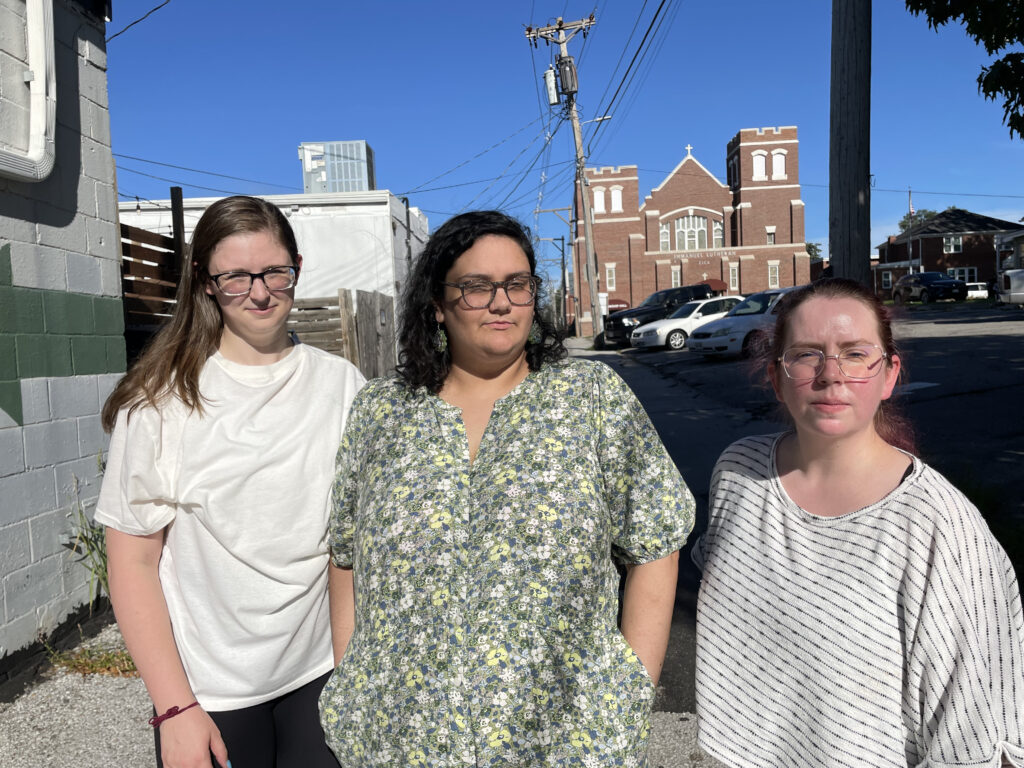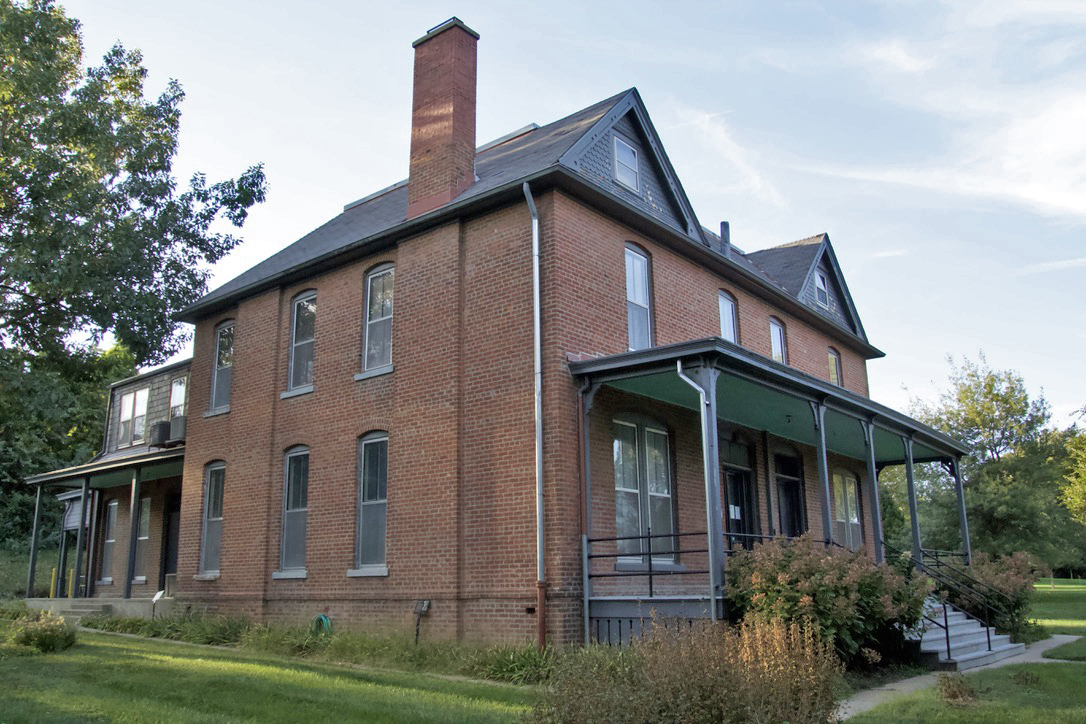On an afternoon this spring, the five employees of the Douglas County Historical Society posed with imitation movie props in front of a gold backdrop. They made funny faces for the playful photo meant to promote an upcoming exhibit on 20th century film.
The staffers’ cheerful expressions didn’t show something simmering beneath the surface: their growing frustration with the nonprofit’s all-volunteer board.
On May 6, the photo landed on DCHS’ Facebook page. Ten days later, all five employees were gone.
Four of them quit on the same day, leaving their keys, cut-up business credit cards and resignation letters on the same desk.
“I truly wish I could say I have enjoyed my time at DCHS, but the actions of the Board have negatively impacted the work environment and my mental health,” visitor experience coordinator Meg McCrina wrote in her resignation letter.
Membership coordinator Andria Thompson called the board’s lack of accountability shameful and signed the handwritten letter “Disrespectfully yours.”
The employee exodus came as the culmination of a turbulent year for DCHS, a nonprofit that receives more than $100,000 a year in taxpayer money to operate county archives in Omaha.
Since last summer, DCHS has cycled through three executive directors and shed half its board members. The organization operated in the red last year and appears to have lost money on one of its most notable annual fundraisers, according to financial records.
A Douglas County Board member called the recent news concerning, while an independent nonprofit watchdog said lack of leadership continuity is particularly worrisome given DCHS’ obligation to maintain irreplaceable historical archives.
In interviews with the Flatwater Free Press, former employees alleged that board members use DCHS to entertain themselves and have long neglected the organization’s mission and historic buildings, resulting in damage to the structures and to some of the important documents and artifacts held within them.
Board President George Martin said he and his colleagues serve for the right reasons and give of themselves to help the organization thrive.

The two main North Omaha buildings DCHS occupies — the General Crook House Museum and the adjacent archives center — need some work as any 150-year-old structures would, but there’s no evidence they are compromised or unsound, Martin said.
The board is committing to making the necessary repairs in collaboration with the county and the Metropolitan Community College, which owns the buildings, he said.
DCHS has experienced high turnover since longtime chief Kathy Aultz retired last spring, but under the direction of interim director Whitney West, a former board member, the society is taking a moment to create new budgeting and management processes before remaking the board and staff, Martin said.
“I want to rebuild the board correctly, and I want to rebuild our staff correctly. I’m going to sacrifice speed for quality,” he said.
Mr. Dickens comes to town
Hours after arriving in Omaha on an unseasonably warm November day last year, Gerald Charles Dickens took to a stage at Champions Run country club to channel all 26 characters in his great-great-grandfather’s famous work “A Christmas Carol.”
That evening, he performed a different one-man play about his notable relative at a cocktail party in the Crook House Museum. Attendees paid $90 to get in the door, $85 if they had DCHS memberships.
After two more performances for middle schoolers the following day, Dickens was the guest of honor at a stately private dinner organized and underwritten by longtime non-voting DCHS board member Susie Phillips.
It’s been DCHS’ annual tradition to host Dickens for fundraising events since 2011. Phillips convinced the organization’s former director to bring the performer to Omaha, according to a 2022 blog post by Dickens. Phillips and her husband have become Dickens’ “very good friends over the years.”
“They have even stayed in our home when they took a trip to England a few years ago,” Dickens wrote.
DCHS paid his tour manager Byers Choice more than $24,000 for performances and merchandise between 2019 and 2022, according to grant applications filed by the nonprofit.
But last year, despite a taxpayer-funded grant from Douglas County, the Dickens fundraiser actually lost nearly $1,000, financial records show.
Former employees say the financial loss isn’t the only problem with the event.
The one-man plays have nothing to do with DCHS’ local history-centric mission, Thompson said.

“There was a running joke among us employees that the board was using DCHS as their own personal social club,” Thompson said. “Honestly, that’s exactly what it looks like.”
Martin said the allegation is “not only false, but poorly informed.” Thomas Emmett, who briefly served as DCHS director last year, said in a statement he never witnessed the board behave contrary to its fiduciary duties, adding that members exemplified “servant leadership.”
After Thompson quit, she filed a complaint with the Internal Revenue Service alleging DCHS improperly bought and sold Dickens merchandise without paying or charging taxes. A spokesman for the federal agency said it doesn’t comment on complaints.
Martin said detractors of DCHS-sponsored Dickens performances haven’t “taken the time to understand the relationship between the Dickens family and Douglas County.”
An 1888 news clipping from the Omaha Herald notified readers that Charles Dickens Jr., the novelist’s son, would be performing a reading from “David Copperfield” and “Pickwick” that evening. Gerald Dickens is continuing that tradition more than a century later, Martin said.
Phillips befriended Dickens after the English actor began coming to Omaha, which is part of being a good ambassador for Douglas County, Martin said. Phillips did not respond to requests for comment.
The Dickens event has been a money maker in prior years, and Martin expects it will be again when paid for entirely by private donors. Even if it doesn’t rake in cash, the performances bring joy to community members and help DCHS get donors and volunteers in the long run, he said.
Missing shingles
Former employees say the board should focus on fixing glaring issues with DCHS’ historic buildings on MCC’s North Omaha campus.
The General Crook House Museum, which sits on the National Register of Historic Places, has seen several leaks in recent years, including a burst pipe in January that damaged clothing, vinyl records and photo albums, McCrina said.
Martin noted that the pipe burst on one of the coldest days of the year, and board members later helped staff salvage affected objects. All leaks were fixed and have not recurred, Martin said, adding that the interior of the house is in good condition.
Both buildings have asphalt shingle roofs that are not historically accurate and “way past their lifecycle,” said MCC Facilities Director Scott Kardell during a July meeting of the college’s board.
The archives center’s roof — torn in spots and visibly missing shingles — is especially alarming, former employees said. The building houses thousands of important records and artifacts that could be damaged or destroyed, said Liz Boutin, whose six-month stint as director ended in May.
Maria Arbelaez, a history professor emerita who served on the board from 2022 to 2023, noted the center houses immigrants’ naturalization records, which represent “irreplaceable parts of the personal, family, state, and national history.”
DCHS received a $710,000 estimate to replace both roofs, according to a grant application.
Other threats to the archives center include rotting woodwork around windows and a frequently flooded basement, McCrina said. Broken stairs, water-damaged floor spots and boxes of records stacked in walkways made it a difficult place to traverse, she said.

It’s normal for museums to have some backlog of unprocessed materials, but the extreme level of disorganization meant employees struggled to find records desired by researchers, said former weekend greeter Dana Broer.
The lack of accessibility doesn’t just hinder researchers – it’s a disservice to the entire community, McCrina said. “It is cutting people off from the very parts of themselves that help them feel like they know who they are.”
The maintenance problems at the archives center are well known to the board, Arbelaez said in an email.
Staff members who spoke to the board about building conditions left feeling unheard, Boutin said.
McCrina filed a complaint with the City of Omaha about the building conditions after her resignation. City officials did not respond to requests for comment.
Martin said there are spots in archives that look rough to the untrained eye, but the structure is holding up fine. He noted that DCHS has plans to clear clutter from the archives and is reviewing its policy for taking in new material to address the decades-old problem.
Both buildings are technically owned by MCC, but a 2002 agreement charges DCHS with bankrolling any major repairs and renovations. The board is working to reach a new agreement with the community college that outlines DCHS’ role in caring for the buildings, Martin said.
Earlier this year, Boutin wrote DCHS’ first application for county grants in years that didn’t ask for money to put on the Dickens performances. Instead, she requested $100,000 for roof repairs — a necessary reordering of priorities, she said.
Months after Boutin’s departure, county officials awarded DCHS a $90,000 allocation for the roof project, kicking off a fundraising campaign to foot the costly upgrades. The grant added to the roughly $100,000 that the county gives to DCHS each year for operations.

In June, the county board voted to give DCHS $334,000 over the next three years.
County Board Member Chris Rodgers, told of the employee accusations, termed those allegations “concerning.”
“As we do with all other nonprofits that receive county funds, we will follow up regarding the use of public funding and make sure we come to an accountable resolution,” Rodgers said in an email.
If DCHS has to choose between Dickens and maintaining the county’s archives, leaders should recognize that hosting a money-losing fundraiser is a poor use of limited resources, said Chicago-based nonprofit watchdog Laurie Styron.
“It’s nice to have music while the ship’s going down, but it’d be better to patch the holes in the ship,” said Styron, the CEO of CharityWatch.
Charting a new course
DCHS’ public presence has been muted since the mass employee resignation on May 16.
The exhibit on 20th century film opened a month later than announced, and the Facebook account has been silent since the staffers left.
Most of the employees who left haven’t been replaced. But DCHS has continued to offer the same programming through volunteers, and its annual garage sale is happening this week, Martin said.
“We are proud of that fact,” Martin said.
There are fewer voices in board meetings than a year ago. DCHS’ bylaws state that the governing body should have at least 10 members, but after a series of departures and West’s appointment as interim director, the organization has only five voting board members.
The board has identified potential new members but is waiting until there’s more certainty at the director position, Martin said.
Despite last year’s modest losses, DCHS stands on great financial footing and is likely to bring on more employees soon, Martin said.
Styron said DCHS leaders can take several steps to improve the governance of the organization. First, they should increase the size and professional diversity of the board to ensure adequate deliberation and sound decision-making.
The nonprofit also should create a written whistleblower policy, which would give staff recourse for voicing complaints and offer the board clarity for dealing with those situations, Styron said.
Martin said he agrees with Styron’s recommendations. The board president expects the next few years to be transformative for DCHS with stronger internal processes, improved buildings and greater “people power.”
“We could not be more excited about or confident in what we will be able to offer the people of Douglas County moving forward,” Martin said.







16 Comments
You described DCHS and its problems very well. Does the Board have accountability and oversight to any agency or the Unicameral ?
A very good question. It seems like all the board has to say for itself is we’re going to get to that, with no meaningful plan and certainly no apology or accountability for lax oversight that brought the nonprofit to its present dysfunction. The suggestion that the board has treated this taxpayer supported nonprofit as a social club rings true.
I purchased a first-time membership with DCHS in July, unaware of the issues going on there. After not receiving any membership materials or mailings, I called in August and was told they were behind due to an employee departure. Now it’s September and still nothing. After reading this article, I’m beginning to wonder if I’m out my money for the membership.
Excellent article. I experienced the staff disorganization in DCHS in 2015, 2016. My group tried to work with them on a tour and also written material. The staffer was late on all deadlines, re-wrote an approved article (final printed product was inaccurate) and tried to get my organization to do things we were unprepared to do. When we balked at the staffers suggestions, he shut off all contact. We were happy to be rid of DCHS’s association. Unprofessional is the term I’d use. I hate to see the buildings and materials in disrepair, but this is a long-standing problem which will only need more and more monies to repair. It is almost too late. Thank you for alerting the public.
Hi Judy. This is Whitney West, current Interim Executive Director at DCHS. I’m curious who you dealt with 9 years ago and what the exact issues were. Let’s talk offline if you’re willing to do so—I am a longtime DCHS volunteer and am serving in this role to “steady the ship” given the recent staff and ED turnovers. I’d be interested to hear your experience so I can ensure it doesn’t occur in the future, even if it may have occurred some time ago. Please email me—director@douglascohistory.org.
I hope this trifle infighting can stop and these historical buildings and the roof can be fixed. I agree the money received should be spent to bring these buildings up to code. I hate to hear about the “they said” “they said” spats and hope this pettiness can be resolved. It sounds like the volunteers have not been treated well and their concerns are ignored. Never a good environment to build relationships in a volunteer organization and to help better serve the community. Great article! I hope this opens some eyes and helps things change.
Thanks for your story. It confirms my instincts that this is an organization in distress. In late June as a recently relocated retiree, I responded to a SHARE Omaha request on behalf of DCHS for a volunteer grant writer. I received a response and we agreed to an electronic conference on July 2. When the interim ED and a board member did not show, I followed up an hour later to learn that the interim ED was alledgedly not available and dealing with her ill mother. Further, the board member emailed that they would be back in touch. No one contacted me and I just thought that the people were rude. Then, in early August I saw another volunteer opportunity announcement for a DCHS grant writer. That’s when I determined that the leadership was not only rude, but also lacked ability. As the former executive director of the American Red Cross (Museum) Historical Resources Department and Cultural Tourism DC, I would have jumped all over a person who offered to volunteer and help me raise money!
I am a Douglas County Historical Society member and volunteer. Yes, the organization has faced terrible employee loss this year, but the views written in this article place too high a value on the comments by disgruntled former employees. They chose to turn their backs on the Society. Besides the excellent leadership of the Board President, several board members have stepped up to keep things running and are sacrificing their own time to do so. I would point out that much of the negative reports have another perspective, and would hope that a reporter would have found that out.
More than 20 years ago, I served a term as a DCHS Board member.
This story saddens me.
This organization, which is charged with preserving and protecting the rich, precious history of our region, has gone off the rails.
The mass resignations should have set off alarm bells and led to a thorough house-cleaning of the leadership.
Instead, DCHS languishes.
What a shame.
Who is responsible for the comments in this section? I posted a comment yesterday with pertinent information and challenges to the article’s negativity. Now my comment no longer is showing up. This smacks of bias and is not giving every chance of perspective!
Hi Karen! We manually approve comments, making sure there aren’t libelous claims, personal attacks, and that sort of thing. We generally only do that once a day; I just laid eyes on your comment from yesterday for the first time and approved it.
Thanks!
Thank you! I am pleased to see that my first comment was brought back to the list of comments here!
This story completely missed the mark. I have volunteered at DCHS for years and the organization is full of dedicated volunteers, including the volunteer board, who give their time, talents, and financial support and ask for nothing in return. DCHS has its challenges, like many nonprofits, but any implication that it’s members, volunteers, and board somehow don’t care about the mission or the Crook House is completely false.
Simply publishing unfounded allegations by disgruntled ex-employees is not journalism. Also, how is the opinion of an out of state consultant with no ties to Omaha or DCHS relevant or appropriate?
Do better Flatwater. Your publication usually does great work, so hopefully this is an outlier.
Hi JC! I would like to say that I am not a “disgruntled ex-employee” but a professional in the non-profit sector who had to step away from DCHS after finding evidence of mismanagement of funds, inappropriate programming, and lack of care by the board. Those of us who left are all museum/ nonprofit professionals who could no longer be quiet about the misdeeds being conducted when the board ignored our professional opinions, which were based on years of education and work experience. Currently on the board and in admin personnel, there is no one with museum nor non-profit administration experience.
Working on genealogy for 30 plus years it was appalling to see these extremely old county records stacked in stairways and piled high in room corners etc. The record search is extremely high also. Perhaps finding a permanent space at the MCC for all these irreplaceable documents would be a better home than this building they currently stored in. Omaha public library does a fine job plus on line records are available and genealogy area is a more appropriate for these records that actually belong to the public. Please get all these records to a safe and more accessible place for public use rather than attics and stairways with poor air ventilation and dripping roofs. Please all these county records should be digital by now for public access. Thank you for the comment area. Best of luck.
Some years ago, an advocate searched for historical documents and material related to the rich diversity of Nebraska and Douglas County. In short, she indicated that it was lacking certain aspects. Moreover, considering the content of this article, we need to do a better job in Nebraska of tracking the ethnic and racial history of the various groups and how they arrived in Nebraska. It’s my experience that if you don’t have board members and staff of color with a zeal for those topics, we become like the forgotten minority, which is often used to refer to Native Americans. How can we have a state that is 20 percent People of Color, and there are no footprints within this white fragility organization history? We are looking for outcomes, outputs, and empirical data related to our rich history, not the traditional trivial promoted in educational institutions.